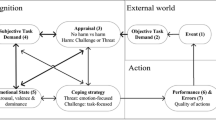Abstract:
Emergency situations in industry occur suddenly and often unexpectedly; operators must make critical decisions under stress, and the consequences of errors can be immediate and catastrophic. Training effective performance under stress becomes an important aspect in the management of emergencies. This article proposes a taxonomy of cognitive strategies that enable operators to regulate their thinking and adapt decisions to changes in the demands of the situation. Cognitive strategies, such as, tolerating uncertainty, managing workload, planning for contingencies, and self-monitoring, provide the content of training emergency response. Stress, however, interferes with the learning of strategies, which presents a challenge to the design of training methods. Exposure to stress during training, degree of task decomposition, guidance, contextual variety and feedback are some of the training methods explored to facilitate the acquisition and transfer of cognitive strategies. Diversions from the traditional systems approach to training are pointed out and areas for further training research are identified.
Similar content being viewed by others
Author information
Authors and Affiliations
Rights and permissions
About this article
Cite this article
Kontogiannis, T. Training Effective Human Performance in the Management of Stressful Emergencies. CTW 1, 7–24 (1999). https://doi.org/10.1007/s101110050007
Issue Date:
DOI: https://doi.org/10.1007/s101110050007




